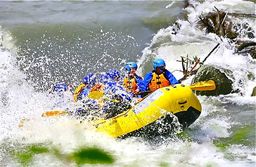
How do you define play? Do you take time to play? Is play part of your worklife? Ronit Kark (2011) quoted Stuart Brown (2009): “ . . . play is a catalyst. The beneficial effects of getting just a little true play can spread through our lives, usually making us more productive and happier in everything we do.”
Kark suggested play activities (such as outdoor programs, role playing, simulations, strategy games, etc.) improve an organization’s leadership development efforts. So what characterizes play in leadership development? (From my reading of Kark’s article).
(1) Play is separate from work. It involves different purposes and processes. Play is often more fun, enjoyable.
(2) Play occurs in a psychologically, socially safe environment. A person, a leader, may be able to try different behaviors, even take on different identities, and not be as concerned about how one is perceived. For example, “It’s only a game.”
(3) Play usually occurs in groups. Play can be a form of social learning, exploring relationships, collaboration, understanding others. Example: learning to share, learning to trust. Play may improve team functioning, help teams overcome obstacles to working together.
(4) Play is creative. Kark suggested team creativity improves because “managers who have experienced play in leadership development processes can use a more playful orientation in their teams’ meetings and capitalize on this playful mode to build a safer environment for team members to interact” (p. 519). The result is more creativity, flexibility in thinking, better problem solving.
My thoughts:
(1) If you enjoy doing a learning activity, you will learn more. In the classroom I look for fun ways to learn new material. Play can be a good way to learn and retain.
(2) Play does give you the opportunity to experiment with different behaviors. Self-reflection is good. Feedback from a trained observer is better.
(3) There are probably large individual differences here. Some people never develop an aptitude for play. It was not part of their childhood development nor a significant part of their adulthood. They may view play in leadership or team development as a waste of time.
(4) Many factors may affect the quality of the outcomes from the play activity: the culture of the organization (is trust a core value?), the ability and knowledge of the facilitator(s) (are they simply following a learned procedure or do they have knowledge-based insights into the process), what is the perceived reward for participation in such activities.
Play activities may have a place in leadership development. To quote Stuart Brown: “Play energizes us and enlivens us. It eases our burdens. It renews our natural sense of optimism and opens us up to new possibilities.”
Kark, R. (2011). Games managers play: Play as a form of leadership development. Academy of Management Learning & Education, 10 (3), 507-527.
Image from: http://www.flickr.com/photos/luigimengato/5019419437/in/photostream/
Used with permission: http://creativecommons.org/licenses/by/2.0/deed.en
 RSS Feed
RSS Feed